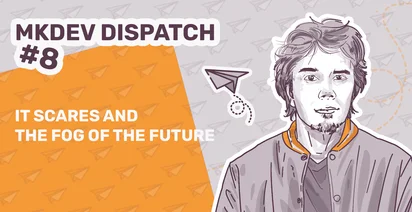IT Scares and the Fog of the Future | ✉️ #8

Hey! 👋
While wandering the empty halls of mkdev as Christmas approaches and everyone takes a week off, I found this space empty, so this one time you'll hear from me, a behind-the-scenes guy.
I won't be able to give you a unique DevOps and Cloud insight, you'll have to wait for Pablo and Kirill to return for that. Everyday people rarely have them. When you work in IT or around it, it's easy to forget how little people think about what's going on in their computers, even as 2023 approaches and computer literacy seems to become the norm. It rarely goes beyond the few buttons you've learned to push to get your dopamine reward every day. General public only notices the IT world, as huge as it is, when the new IT scare comes around. "The Robots Are Coming!", "The Robots Are Coming!".
For the last few months in my social media feeds I've been following the latest AI vs. the artists scandal. You've probably heard of it, it's about Lensa and AI generated avatars that became popular lately. It's not that ethical and legal aspects of this new world are not a real topic to discuss, of course they are. As Kirill says in Meditation 18 of our book, 'The Humanitarian Developer', we live in a society, programming doesn't happen in a vacuum. We create new things before we even know how to apply our own rules to them and what the consequences of that might be. It's just that rarely the nuance of it gets reflected in the discourse. The public outcry is mostly about starving artists plaguing the streets as computers take over, and that's it. The robots are coming, run for your life.
Scientific and computer literacy, and, by extension, science communication are key in bringing the nuance to the general discourse. Society can learn, and scared noises become loud and clear discussions of our future with consensus of opinion available and progress imminent. Partly, that's why mkdev continues to produce free educational materials, even as we continue to move away from individual training to business consultancy. Business is business, but many might argue that knowledge should be free.
As the end of the year approaches, I say to you: the robots are not coming, sleep well, Merry Christmas and Happy Holidays!
What we've shared
The Best Service Mesh: Linkerd vs Kuma vs Istio vs Consul Connect comparison + Cilium and OSM on top.
DevOps Accents, episode 3: Cloud gaming, Kate Bush effect, impressive buildings and more
What we've discovered
What's Inside Of a Distroless Container Image: Taking a Deeper Look
Why Java is still champ: We are big fans of Ruby at mkdev, and our second choices are normally Go and Python. But we can’t deny popularity of Java, especially when most of our customers are using either Java or JVM-based languages. This post explains how Java is still so big, and points to some of the most important innovations there in last 5 years.
Terraform: chicken/egg problem: Obvious but Interesting.
A multi-dimensional approach helps you proactively prepare for failures, Part 1: Application layer: A simple overview of various methods and approaches to prepare your application for failure.
A very helpful video explaining mTLS and how to make use of it with Linkerd Service mesh with K8s
The 9th mkdev dispatch will arrive on Friday, January 6th. See you next time!
